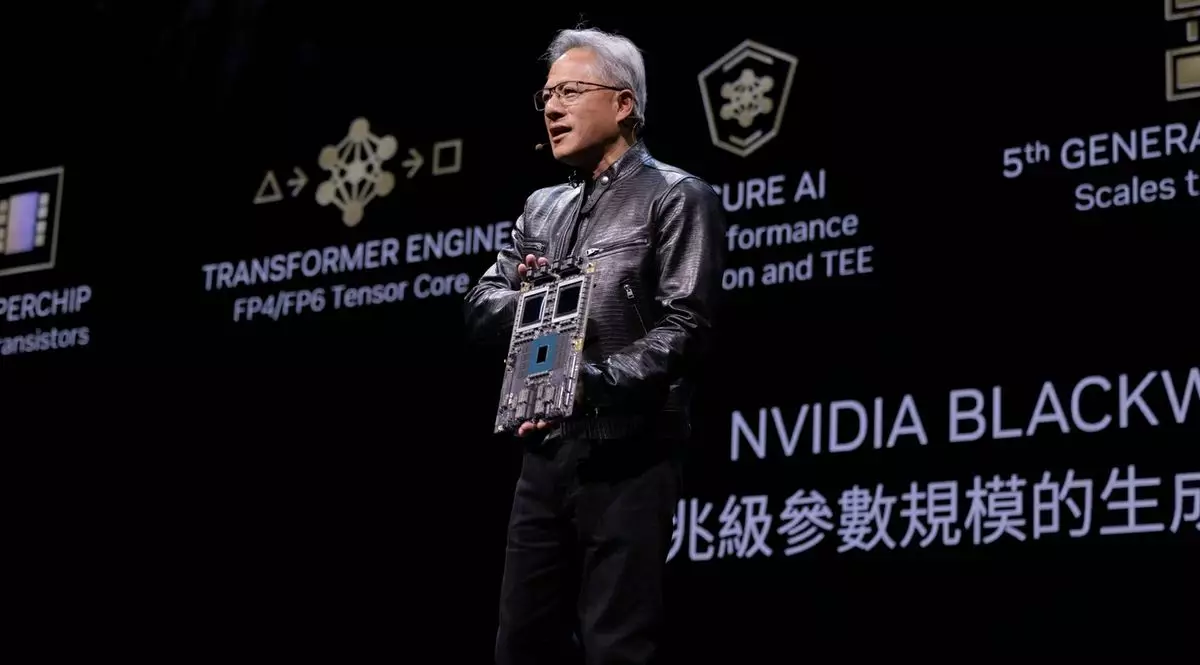In the rapidly evolving landscape of technology, few roles carry as much weight and responsibility as that of a CEO, especially in a revolutionary company like Nvidia. Jensen Huang, Nvidia’s co-founder and CEO, has found himself at the helm of a company that is not just participating in the artificial intelligence (AI) revolution but is actively steering its course. With a roster of clients that includes nearly every major tech entity, the pressure to deliver is immense, and during a recent address at the Goldman Sachs Communacopia + Technology Conference, Huang candidly shared the burden that comes with such industry dominance.
Huang’s revelations about the emotional stakes involved in Nvidia’s operations highlight an aspect of corporate leadership that is often overlooked: the psychological toll of responsibility. “Our company works with every AI company in the world today,” he stated, underscoring Nvidia’s integral role in the broader tech ecosystem. This centrality has placed Huang in a unique position where the expectations from clients run extraordinarily high, leading to a state of heightened emotional intensity. For him, and many like him, it is not just about delivering products but about understanding that their innovations directly influence clients’ financial success and market competitiveness.
The concept of “emotional customers” isn’t just business jargon but points to the human side of technology; the software and hardware that Nvidia creates are critical to the AI ambitions of countless companies. Huang emphasized that the pressure resultant from these relationships is palpable, with every tech advancement taking on greater significance in a competitive landscape that demands quick advancements and unyielding success.
Huang’s confessions on the profound demand for the new Blackwell AI GPUs signify a clear indication of the relentless pace at which the tech sector operates. With pre-announcement orders reaching tens of thousands, Nvidia is not merely reacting to demand but shaping the future of computing as we know it. “Everybody wants to be first, everybody wants to be most,” he said, which becomes a mantra of the industry—where competition is fierce, and innovation needs to be rapid and pervasive.
The juxtaposition of exhilaration and trepidation permeates Huang’s experience. While he relishes the thrill of pioneering new technological eras and witnessing remarkable advancements in applications and robotics, the looming shadow of potential failure is a constant burden. This relentless cycle of demand and innovation illustrates a fundamental truth in business leadership: success is often paired with immense risks, and these leaders must navigate both waters with agility.
When discussing the toll that such intense pressure can take on personal well-being, Huang’s reflection on sleep stands out. Remarkably, he confessed to needing just “three solid hours” a night. This sentiment shines a light on the sacrifices that often accompany great success. For most people, such a lack of sleep would be untenable; yet, for Huang, it represents a commitment to fulfilling the monumental responsibilities of leading a tech giant amid fierce competition.
Such admission raises questions about the sustainability of leadership in high-stakes environments. While Huang’s commitment to driving Nvidia forward may be commendable, it reinforces a troubling narrative in the corporate world: is relentless work justified at the expense of personal health? How long can one maintain such a regimen without facing the inevitable consequences?
Despite the challenges faced daily, Huang remains optimistic. He views the work of shaping AI as an adventure, filled with exciting possibilities. Nvidia is on the brink of shipping its cutting-edge Blackwell AI GPUs in Q4 of this year, reflecting the company’s continuing stride toward innovation. Huang’s confidence echoes throughout the tech community, promising that Nvidia’s pace will not wane.
Navigating the complexities of leading a technological powerhouse amid rising expectations will always come with its hurdles. However, the commitment to innovation and the pursuit of excellence remains the driving force within Nvidia. As Huang puts it, even in times of immense pressure, the journey remains incredibly rewarding—making it all worth it for those involved. Each challenge faced in the realm of AI technology not only tests the mettle of leadership but also redefines the boundaries of what’s possible in the tech industry.

